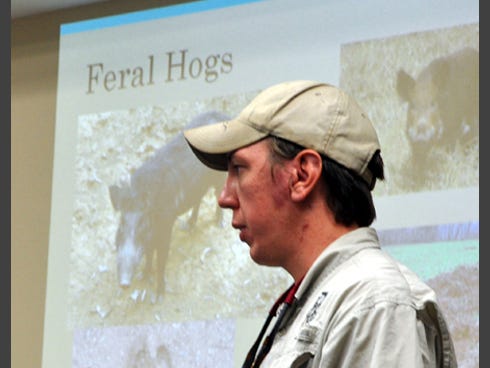
CRESTVIEW — Ken and Janet Jacklin, who live on Old South Drive in Crestview, have a pig problem.
"It looks like someone went in there with a plow," Ken Jacklin said, referring to wild hogs uprooting his lawn.
The couple’s property lacks enough space for a corral trap, the preferred method of catching feral hogs, and living within city limits precludes the possibility of killing the pigs.
"I don't think that there is a way to get rid of them,” Ken Jacklin said.
Jennifer Bearden, a University of Florida-Okaloosa County Extension agent, said neighborhoods should work together for solutions.
"The biggest thing is cooperating … finding a land owner that has large enough land, where the hogs are coming through, and be able to trap them," she said. "The best thing for them would be to contact a local trapper … that can trap the entire sounder at one time."
Capturing a sounder — a group or family of pigs — is the most effective method, experts said Thursday during a meeting at the extension office.
Rapid reproduction
Catching or killing one or two pigs at a time would have little impact because the animals reproduce young. Male pigs, or boars, can be sexually mature at 7 months old, said Andrew Lee, a wildlife biologist with the Florida Fish and Wildlife Commission. Female pigs, or sows, can be sexual at 9 months old.
Such rapid reproduction concerns the Jacklins and others affected by the hogs — particularly since the animals have an appetite for their lawns.
"Eighty percent of their diet is plant material," Lee said, adding that feral pigs enjoy roots under grass and can find them easily with their keen sense of smell.
Ecosystems’ enemies
The extension office has received complaints from residents near Antioch Road, P.J. Adams Parkway and Old Bethel Road, which fits with feral pigs’ general habitats, Bearden said.
"Anywhere close to the rivers that run through Crestview can have (wild hog) problems," she said, adding the animals’ path of destruction can harm fragile ecosystems.
Feral hogs raid and eat the contents of sea turtle, quail and turkey nests, Bearden said. The pigs also “decimate the wire grass, they decimate the root structure of the (long leaf) pines and cause them to weaken.”
Handling wild hogs
Once a wild pig is caught on private property, the property owner is responsible for whatever happens next.
State law allows property owners outside city limits to kill such nuisance animals, as long as they shoot on their own property and not in the direction of an occupied dwelling.
Crestview, Laurel Hill and other Okaloosa County residents within their respective city limits may not kill the pigs, and they should not trap the animals only to release them in other areas, experts said.
Trapping feral pigs and releasing them in other areas, including the Eglin reserves or near Yellow River, would harm the ecosystem they were transported to, experts said.
Instead, call the extension office, 689-5850, for assistance, Bearden said.
Contact News Bulletin Staff Writer Matthew Brown at 850-682-6524 or matthewb@crestviewbulletin.com. Follow him on Twitter @cnbMatthew.
This article originally appeared on Crestview News Bulletin: Extension: neighborhoods must work together to solve pig problem
